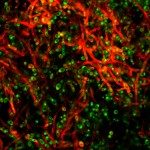Link to Pubmed [PMID] – 38468305
Link to DOI – 10.1186/s40168-023-01746-0
Microbiome 2024 Mar; 12(1): 50
Antibiotics notoriously perturb the gut microbiota. We treated healthy volunteers either with cefotaxime or ceftriaxone for 3 days, and collected in each subject 12 faecal samples up to day 90. Using untargeted and targeted phenotypic and genotypic approaches, we studied the changes in the bacterial, phage and fungal components of the microbiota as well as the metabolome and the β-lactamase activity of the stools. This allowed assessing their degrees of perturbation and resilience.While only two subjects had detectable concentrations of antibiotics in their faeces, suggesting important antibiotic degradation in the gut, the intravenous treatment perturbed very significantly the bacterial and phage microbiota, as well as the composition of the metabolome. In contrast, treatment impact was relatively low on the fungal microbiota. At the end of the surveillance period, we found evidence of resilience across the gut system since most components returned to a state like the initial one, even if the structure of the bacterial microbiota changed and the dynamics of the different components over time were rarely correlated. The observed richness of the antibiotic resistance genes repertoire was significantly reduced up to day 30, while a significant increase in the relative abundance of β-lactamase encoding genes was observed up to day 10, consistent with a concomitant increase in the β-lactamase activity of the microbiota. The level of β-lactamase activity at baseline was positively associated with the resilience of the metabolome content of the stools.In healthy adults, antibiotics perturb many components of the microbiota, which return close to the baseline state within 30 days. These data suggest an important role of endogenous β-lactamase-producing anaerobes in protecting the functions of the microbiota by de-activating the antibiotics reaching the colon. Video Abstract.









